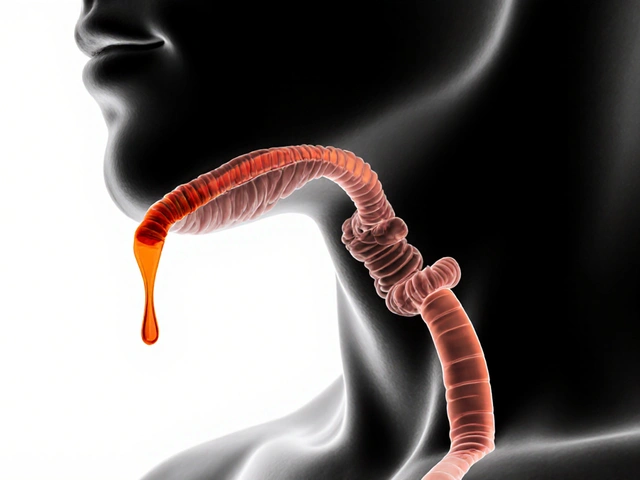
Sleep Aid Comparison Tool
Select a sleep aid below to see its key pharmacological attributes:
Selected Agent Details
Click on a button above to view details about a specific sleep aid.
Doxylamine Succinate is an first‑generation antihistamine that crosses the blood‑brain barrier and produces drowsiness, making it a popular over‑the‑counter (OTC) sleep aid. It blocks H1 histamine receptors, slows neuronal firing in the central nervous system, and typically starts working within 30‑60 minutes. Because it also has anticholinergic properties, users may notice dry mouth, next‑day grogginess, or blurred vision, especially at higher doses.
Why Compare Doxylamine with Other Sleep Aids?
Most people reach for a sleep aid when midnight rolls around and the mind won’t shut off. The market is crowded: antihistamines, herbal extracts, and prescription sedatives all promise a night of solid shut‑eye. Picking the right one depends on three jobs the reader likely wants to finish:
- Identify how fast each option works and how long it lasts.
- Weigh efficacy against side‑effect risk, especially for daily use.
- Decide whether an OTC product or a prescription is the safest fit for personal health conditions.
Below you’ll find a side‑by‑side look at the most common alternatives, backed by dosage guidelines, half‑life data, and real‑world safety notes.
Key Pharmacologic Attributes
Understanding a few basic concepts clears up most confusion. Here’s a quick cheat‑sheet:
- Onset of Action: How quickly users feel drowsy after the dose.
- Duration: Length of sleep‑promoting effect, typically measured in hours.
- Half‑Life: Time for the drug’s plasma concentration to fall by 50%; influences next‑day sedation.
- Regulatory Status: OTC vs prescription, and any pregnancy‑category warnings.
Comparison Table
| Agent | Primary Use | Onset | Duration | Half‑Life | OTC Status | Pregnancy Category |
|---|---|---|---|---|---|---|
| Doxylamine Succinate | Sleep aid, allergy relief | 30-60min | 6-8h | 10-12h | OTC (U.S.) | CategoryB (generally safe) |
| Diphenhydramine | Sleep aid, allergy, motion sickness | 30-45min | 5-7h | 9-12h | OTC | CategoryB |
| Meclizine | Motion sickness, vertigo | 1h | 8-12h | 6-12h | OTC (some regions prescription) | CategoryB |
| Hydroxyzine | Anxiety, pruritus, pre‑medication | 15-30min | 4-6h | 20-25h | Prescription | CategoryB |
| Melatonin | Regulate circadian rhythm | 15-30min | 4-8h | 30-50min | OTC (dietary supplement) | Not classified (generally safe) |
| Valerian Root | Herbal sleep promoter | 30-60min | 5-7h | Not applicable (herbal extract) | OTC (dietary supplement) | Not classified |
| Zolpidem | Prescription insomnia | 15-30min | 6-8h | 2-3h | Prescription | CategoryC |
Deep Dive into Each Alternative
Diphenhydramine
Often sold as Benadryl, diphenhydramine shares the same histamine‑blocking mechanism as doxylamine but carries a higher risk of next‑day grogginess. Its 9‑hour half‑life means residual sedation can linger, especially for older adults. Dosage for sleep is usually 25‑50mg 30minutes before bedtime.
Meclizine
Meclizine is more tailored for motion‑sickness and vestibular disorders. While it does induce drowsiness, the effect is milder compared with doxylamine. Its longer duration (up to 12hours) can be useful for night‑shift workers but may cause “hang‑over” fatigue.
Hydroxyzine
Hydroxyzine is a prescription antihistamine with strong anxiolytic properties. The long half‑life (up to 25hours) makes it unsuitable for nightly use unless a clinician tailors the timing. It’s often chosen for patients who need both anxiety control and sleep assistance.
Melatonin
Melatonin isn’t a sedative; it signals to the brain that it’s night. It works best for people with circadian‑rhythm disorders, jet lag, or shift‑work sleep issues. Typical doses range from 0.5mg to 5mg taken 30minutes before lights‑out. Because its half‑life is short, it rarely leaves next‑day sleepiness.
Valerian Root
Extracts of valerian have been used for centuries. Clinical trials show modest reductions in sleep latency, but the effect size is smaller than that of first‑generation antihistamines. Users often combine valerian with chamomile for a calming tea before bed.
Zolpidem
Zolpidem (Ambien) is a non‑benzodiazepine hypnotic prescribed for short‑term insomnia. It binds selectively to the GABA‑A receptor, providing rapid sleep onset without the strong anticholinergic side effects of antihistamines. However, it carries risks of sleep‑walking, complex behaviors, and dependence, so it’s limited to 2‑4 weeks of use.

Safety Profile & Contra‑indications
When choosing a sleep aid, safety trumps convenience. Here are the most common red flags:
- Elderly patients: Anticholinergic load from doxylamine or diphenhydramine can worsen confusion and fall risk.
- Pregnancy & breastfeeding: Doxylamine (CategoryB) is considered relatively safe, while many antihistamines are discouraged in the first trimester.
- Liver or kidney impairment: Drugs with long half‑lives (hydroxyzine, meclizine) may accumulate.
- Operating machinery: All sedating agents impair reaction time; avoid driving or heavy equipment for at least 6hours after dose.
Drug‑drug interactions matter too. Doxylamine can enhance the sedative effect of alcohol, opioids, and other CNS depressants. Hydroxyzine combines with monoamine oxidase inhibitors (MAOIs) leading to heightened anticholinergic toxicity.
How to Choose the Right Option for You
Answer these three quick questions before you reach for the bottle:
- Do I need a one‑night fix or a nightly routine? Short‑acting melatonin or zolpidem works for occasional insomnia; doxylamine or diphenhydramine suit chronic occasional use.
- Am I prone to next‑day drowsiness? If yes, lean toward melatonin or a low‑dose valerian extract.
- Do I have health conditions (e.g., glaucoma, prostate enlargement, heart disease) that worsen with anticholinergic drugs? If so, avoid doxylamine and diphenhydramine; consider hydroxyzine under physician guidance.
For most healthy adults looking for an inexpensive OTC remedy, doxylamine comparison shows it offers a reliable balance of onset speed and duration with a well‑understood safety record. Yet, if you’re sensitive to dry mouth or have an overactive bladder, diphenhydramine or a non‑anticholinergic option like melatonin may feel better.
Related Concepts
Understanding the broader landscape helps you navigate future sleep‑health decisions. Topics that naturally extend from this comparison include:
- Circadian Rhythm Disorders: How misaligned internal clocks drive insomnia.
- Sleep Hygiene: Behavioral tweaks that reduce reliance on medication.
- Cognitive Behavioral Therapy for Insomnia (CBT‑I): The gold‑standard non‑pharmacologic treatment.
- Alcohol‑Induced Sleep Fragmentation: Why combining sedatives with alcohol is risky.
Each of these areas can be explored in separate deep‑dive articles, creating a comprehensive sleep‑health hub.
Bottom Line
Choosing a sleep aid is a matter of matching pharmacologic traits to personal lifestyle and health status. Doxylamine offers a proven, OTC solution with a moderate half‑life and strong sedative effect, making it a solid first choice for many adults. Alternatives like diphenhydramine, melatonin, or prescription zolpidem each have niche strengths-whether you need a gentler herbal route, a hormone‑based rhythm reset, or a fast‑acting prescription.
Always start low, monitor how you feel the next day, and talk to a healthcare professional if you have chronic insomnia or underlying medical issues.
Frequently Asked Questions
Can I take doxylamine every night?
Occasional nightly use is generally safe for healthy adults. Daily use can increase anticholinergic burden, especially in older adults, and may lead to tolerance. If you need a sleep aid most nights, discuss alternatives like melatonin or CBT‑I with your doctor.
How does doxylamine differ from diphenhydramine?
Both are first‑generation antihistamines, but doxylamine typically has a slightly longer duration (6‑8h vs 5‑7h) and a marginally higher sedation profile. Diphenhydramine may cause more next‑day grogginess in some users. Their dosing schedules are similar, so personal tolerance often decides the choice.
Is doxylamine safe during pregnancy?
Doxylamine is classified as CategoryB, indicating no proven risk in animal studies and limited human data. It is a component of the FDA‑approved sleep aid for pregnant women (often paired with pyridoxine). Still, always confirm with your obstetrician before starting any medication.
Can I combine doxylamine with alcohol?
Mixing the two amplifies sedation, impairs coordination, and can depress breathing, especially in higher doses. It’s best to avoid alcohol while taking any sleep‑promoting antihistamine.
What is the fastest‑acting OTC sleep aid?
Zolpidem (prescription) has the quickest onset, but among OTC options, melatonin and diphenhydramine start working within 15‑30minutes. Doxylamine is slightly slower, usually 30‑60minutes.
Are there non‑drug ways to improve sleep?
Absolutely. Consistent bedtime, dimming lights an hour before sleep, limiting caffeine after noon, and CBT‑I are proven methods that reduce reliance on medication.
16 Comments
Write a comment
More Articles

DOACs in Renal Impairment: How to Adjust Doses to Prevent Bleeding and Clots
DOACs like apixaban and rivaroxaban require precise dosing in kidney disease to avoid bleeding or clots. Learn how to adjust doses using Cockcroft-Gault, which DOACs are safest, and why apixaban is often the best choice.

8 Classy Competitors to CVS.com You Need to Check Out in 2025
In 2025, the online healthcare landscape offers numerous alternatives to cvs.com, each with unique features and benefits. This article delves into eight standout competitors, highlighting their advantages and drawbacks to help consumers make informed choices. From innovative prescription services to holistic health platforms, these options are reshaping the way we approach healthcare shopping. Explore these alternatives to find the perfect match for your needs.


Julie Sook-Man Chan
September 25, 2025 AT 23:24Thanks for the thorough comparison; I’ll try doxylamine this weekend.